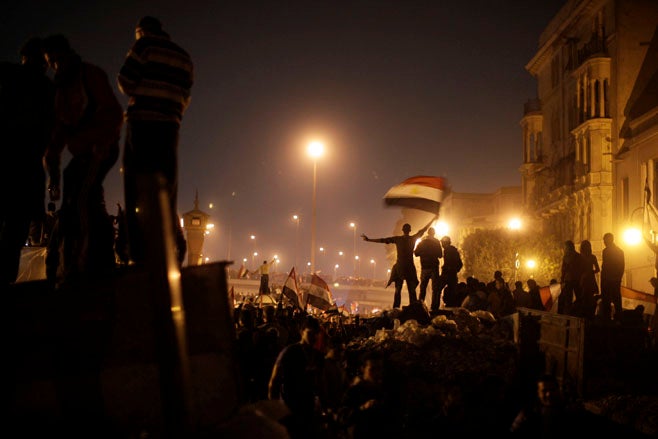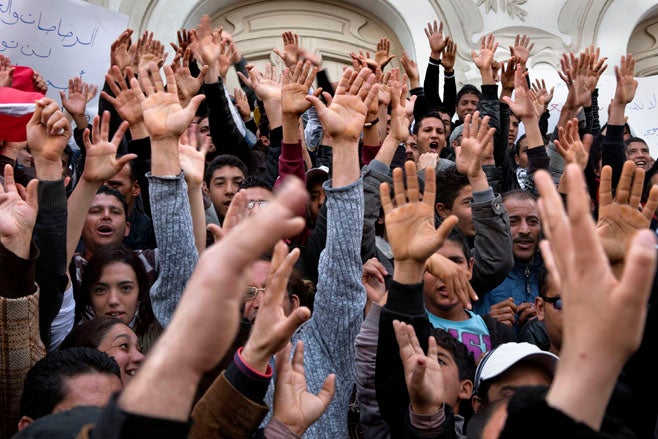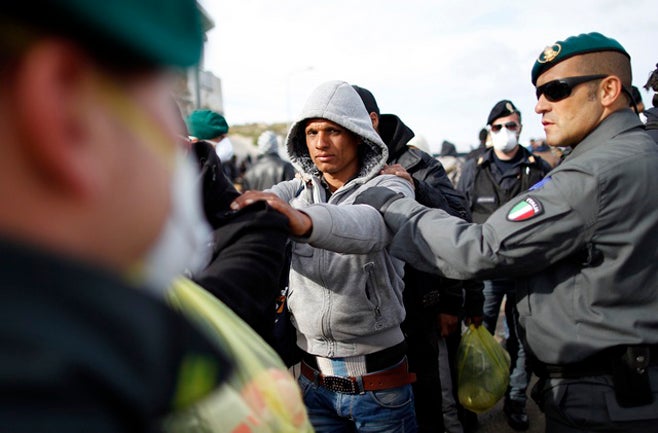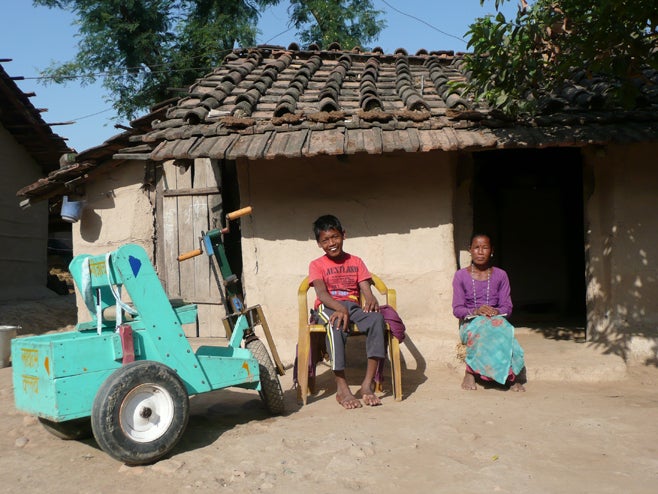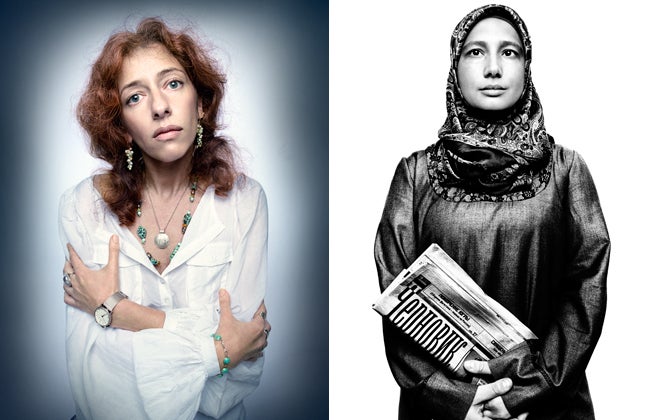Saudi Arabia responded with unflinching repression to demands by citizens for greater democracy in the wake of the pro-democracy Arab Spring movements. King Abdullah bin Abd al-‘Aziz Al Saud announced economic benefits worth over US$130 billion, but authorities continued to jail Saudis for peaceful dissent. New laws introduced or proposed in 2011 criminalize the exercise of basic human rights such as freedom of expression, assembly, and association.
Authorities continue to suppress or fail to protect the rights of 9 million Saudi women and girls, 8 million foreign workers, and some 2 million Shia citizens. Each year thousands of people receive unfair trials or are subject to arbitrary detention.
In March Saudi troops helped quell Bahrain’s pro-democracy protests. Saudi Arabia reacted with dismay to the toppling of Egypt’s President Hosni Mubarak, but supported a transition of power, at least in public, in Yemen and Libya and urged Syria to stop internal repression. At Saudi urging, the Gulf Cooperation Council invited Arab monarchies Jordan and Morocco to join the council, and provided Jordan, Bahrain, Oman, Egypt, and Yemen with substantial financial aid.
Women’s and Girls’ Rights
The Saudi guardianship system continues to treat women as minors. Under this discriminatory system, girls and women of all ages are forbidden from traveling, studying, or working without permission from their male guardians. In 2009 the Ministry of Commerce, though not other ministries, stopped requiring women to conduct ministerial business through a male representative.
On September 25 King Abdullah announced that women will be able to vote in municipal elections in 2015. The government continued to exclude women as voters or candidates in the September 2011 municipal elections, despite a two-year delay to allow for logistical preparations to include women. In March 2011 women activists launched the Baladi (My Country) campaign in protest, trying—unsuccessfully—to register to vote. In the first municipal elections in 2005, authorities said that election workers could not verify a woman’s identity since many did not have identity cards. However, the Interior Ministry began issuing identity cards to women over 22 years old in 2000. The king also promised to appoint women as full members of the Shura Council.
On May 22, Saudi authorities arrested Manal al-Sharif after she defied the kingdom’s de facto ban on women driving. Al-Sharif appeared in a video showing herself behind the wheel. Prosecutors charged her with “tarnishing the kingdom’s reputation abroad” and “stirring up public opinion,” according to Saudi press reports. On May 30, Khobar police released al-Sharif from prison after she appealed to King Abdullah.
On June 17 around 40 women with international drivers’ licenses participated in a “women2drive” campaign. No law bars women from driving, but senior government clerics have ruled against the practice. Saudi Arabia is the only country in the world to prohibit women from driving.
Migrant Worker Rights
Over 8 million migrant workers fill manual, clerical, and service jobs, constituting more than half the national workforce. Many suffer multiple abuses and labor exploitation, sometimes amounting to slavery-like conditions.
The kafala (sponsorship) system ties migrant workers' residency permits to their “sponsoring” employers, whose written consent is required for workers to change employers or exit the country. Employers abuse this power to confiscate passports, withhold wages, and force migrants to work against their will.
In August Jadawel International, owned by Saudi Arabia's third richest man, Shaikh Muhammad bin Issa Al Jaber, was six months in arrears with salary payments, as in previous years, and managers threatened workers not to pursue complaints in labor court.
Some 1.5 million migrant domestic workers remain excluded from the 2005 Labor Law. As in years past, Asian embassies reported thousands of complaints from domestic workers forced to work 15 to 20 hours a day, seven days a week, and denied their salaries. Domestic workers, most of whom are women, frequently endure forced confinement, food deprivation, and severe psychological, physical, and sexual abuse.
In December 2010, authorities made no attempts to rescue an Indonesian migrant domestic worker who had worked for 10 years without pay and whose sponsors were “renting” her out to other houses, according to one Saudi woman who informed authorities. In November 2010, authorities in Abha, southern Saudi Arabia, recovered the body of Kikim Komalasari, a 36-year-old Indonesian domestic worker, bearing signs of extensive physical abuse. In September an appeals court overturned a three-year prison sentence for the employer found guilty of severely assaulting Sumiati Mustapa, her Indonesian domestic worker. In June the government beheaded Ruyati binti Sapubi, an Indonesian domestic worker convicted of murdering her employer who allegedly refused to allow binti Sapubi to return home. Courts sentenced another Indonesian domestic worker to death for killing her employer after he allegedly tried to rape her.
Saudi Arabia continued to deport hundreds of Somalis to Mogadishu, Somalia’s capital, according to the Office of the United Nations High Commissioner for Refugees, despite the acute violence there.
Criminal Justice and Torture
Detainees, including children, commonly face systematic violations of due process and fair trial rights, including arbitrary arrest and torture and ill-treatment in detention. Saudi judges routinely sentence defendants to thousands of lashes.
Judges can order arrest and detention, including of children, at their discretion. Children can be tried and sentenced as adults if physical signs of puberty exist. The Interior Ministry said it had executed Bandar al-Luhaibi, a child, in October for killing his grandmother.
Authorities rarely inform suspects of the crime with which they are charged, or of supporting evidence. Saudi Arabia has no penal code, so prosecutors and judges largely define criminal offenses at their discretion. Lawyers do not assist suspects during interrogation and face difficulty examining witnesses or presenting evidence at trial.
From January to October 2011 Saudi Arabia had executed at least 61 persons, including two women and one child, mostly for murder or drugs offenses, but also a Sudanese man, Abd al-Hamid al-Fakki, for “sorcery.”
In March a court, after only two sessions, sentenced four Iraqis and two Syrians to the amputation of one foot and one hand each for stealing money from a supermarket. One of the Iraqis told Human Rights Watch that interrogators physically tortured him for eight days into a signing, unread, a prepared confession.
Secret police detained without trial or access to lawyers, in many cases for years, thousands of persons suspected of sympathies for or involvement with armed groups, or for their peaceful political views.
In July the government proposed a counterterrorism law that would criminalize “infringing upon the interests of the kingdom” or “describing the king—or the crown prince—as an unbeliever, doubting his integrity, defaming his honesty, breaking the [oath of] loyalty [to him], or inciting such [acts].”
Prisoners and detainees in several facilities described inhumane conditions. On January 3 Mikhlif al-Shammari, a rights advocate detained in Dammam prison since June 2010, alleged that guards beat inmates. According to his family, guards assaulted al-Shammari in July for his criticisms by putting a chemical agent in his mouth.
Freedom of Expression, Belief, and Assembly
Authorities further tightened the space for public criticism of officials or government policies in the wake of the pro-democracy Arab Spring movements. The Ministry of Culture and Information heavily censored print and broadcast media. Internet critics crossing vague "red lines" faced arrest.
In October 2010 the General Court in Qubba, in northern Saudi Arabia, sentenced to lashes Fahd al-Jukhaidib, a local journalist and teacher who reported on a rare protest against the local electricity company. In December authorities detained incommunicado for three months Muhammad al-'Abd al-Karim, a professor of Islamic jurisprudence, for an online article speculating whether Saudi Arabia would survive as a political entity without the ruling Saudi royal family.
In July the authorities arrested prominent cleric Dr. Yusuf al-Ahmad, one day after he criticized the Interior Ministry’s policy of long-term detention without charge or trial.
In January Minister of Culture and Information Abd al-‘Aziz Khuja issued the Executive Regulation for Electronic Publishing Activity, which subjects virtually all news and commentary distributed electronically to the country's press law, including the requirement for a press license.
In April King Abdullah amended the 2000 Press and Publications Law to further prohibit speech that "contradicts rulings of the Islamic Sharia [law] or regulations in force," or "call[s] for disturbing the country's security, or its public order, or … caus[es] sectarianism or … damage[s] public affairs in the country." New restrictions also include a prohibition on damaging the reputation of the chief mufti, members of the Council of Senior Religious Scholars, or any other government official or government institution.
Saudi Arabia does not tolerate public worship by adherents of religions other than Islam and systematically discriminates against its religious minorities, in particular Shia and Ismailis (a distinct branch of Shiism). Official discrimination against Shia encompasses religious practices, education, and the justice system. Government officials exclude Shia from certain public jobs and policy questions and publicly disparage their faith.
This discrimination sometimes amounts to persecution. Professing Shia beliefs in private or in public, in particular at holy sites in Mecca and Medina, may lead to arrest and detention. In October the Interior Ministry said that it would pursue what it called “radicalized or hired instigators” among the Shia with an “iron fist.”
Prince Badr bin Jilawi, governor of Ahsa' province, repeatedly had Shia citizens detained, in violation of Saudi criminal procedure law, for private prayer or public display of Shia banners or slogans. The domestic intelligence agency in February summoned and then arrested Shia cleric Tawfiq al-‘Amir after he had called for a constitutional monarchy and equal rights for Shia in his Friday sermon.
On March 5 the Interior Ministry categorically prohibited public protests “because they contradict the principles of the Islamic Shari'a and the values and customs of Saudi society." The royally appointed Council of Senior Religious Scholars, whose interpretation of religious law is binding, seconded the ban, and intelligence forces in March arrested Muhammad al-Wad'ani, and Khalid al-Juhani for advocating protests for political change.
Small, peaceful protests by Shia took place since late February in the Eastern Province, demanding the release of nine "forgotten" Shia detained for over 13 years without charge or trial on suspicion of involvement in a 1996 attack on a United States military installation in Khobar, which killed 19. Saudi authorities detained 160 protesters until May, and at least 40 remained in detention at this writing.
In March a small group of Sunni Saudis demonstrated in Riyadh, the capital, calling for the release of thousands of people detained for years without charge or trial on suspicion of involvement in militant activity. Police arrested several, including three women as well as lawyer Mubarak bin Zu’air and rights activist Muhammad Bajadi, both of who remain in detention. In August Judge Abd al-Latif al-‘Abd al-Latif prohibited defense lawyers for Bajadi from attending a trial session in a secret location of the Specialized Criminal Court, a state security tribunal for terrorism cases, where Bajadi faced charges of “insurrection against the ruler,” “instigating demonstrations,” and “speaking with foreign [media] channels.”
Police in October arrested human rights activist Fadhil al-Manasif after he complained about the police seizing two elderly citizens in order to pressure their sons to give themselves up. The sons were wanted in connection with peaceful demonstrations in the Eastern Province. Al-Manasif, who was detained from May until August for peaceful protest, remains in incommunicado detention. A judge in September charged rights activist Walid Abu al-Khair with “offending the judiciary,” “asking for a constitutional monarchy,” and “participating in media [programs] to distort the reputation of the country.”
Saudi Arabia does not allow political or human rights associations. In February intelligence forces arrested six persons who planned to found the kingdom’s first political party.
Key International Actors
Saudi Arabia is a key ally of the US and European countries. The US failed to publicly criticize Saudi human rights violations or its role in putting down pro-democracy protests in neighboring Bahrain. US President Barack Obama failed to mention Saudi Arabia in a major speech on the Arab uprisings and continued to pursue a $60 billion arms sale to Saudi Arabia, the biggest-ever US arms sale.
In June Germany proposed to sell the kingdom over 200 tanks, worth $5 billion.
UN High Commissioner for Human Rights Navenathem Pillay criticized a spate of executions in October. Indonesia’s President Susilo Bambang Yudhoyono in July publicly criticized treatment of Indonesian workers in Saudi Arabia, as did a fact-finding delegation of Philippines lawmakers in a report issued in January.
